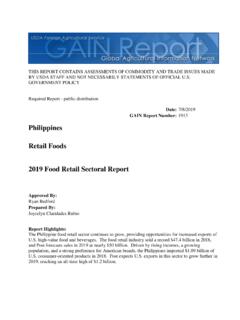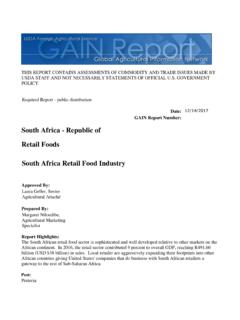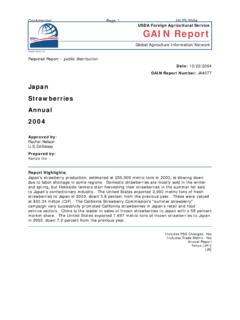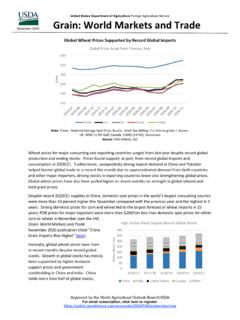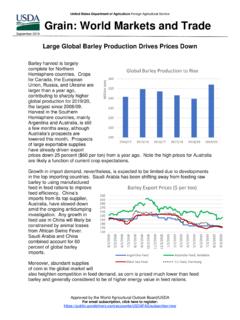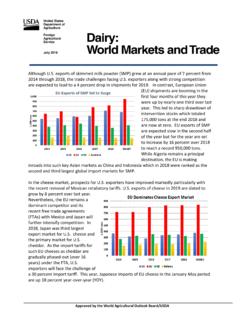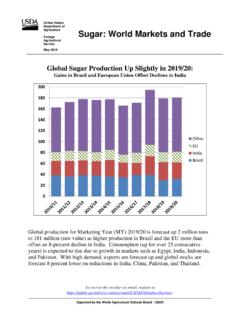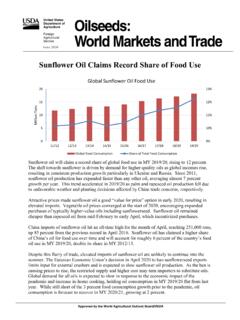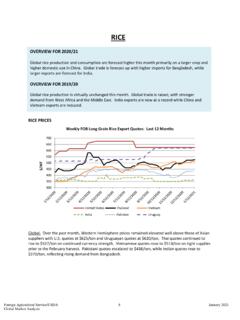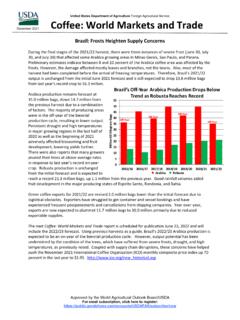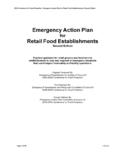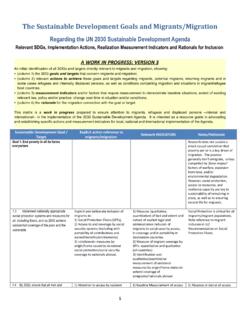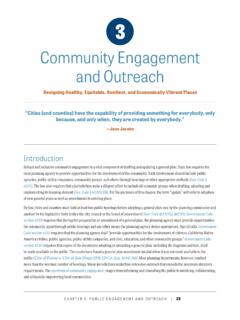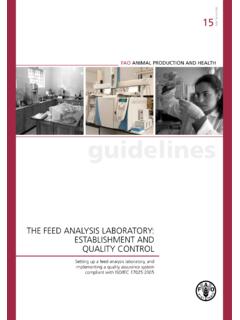Transcription of United Arab Emirates Food and Agricultural Import ...
1 THIS REPORT CONTAINS ASSESSMENTS OF COMMODITY AND TRADE ISSUES MADE BY. USDA STAFF AND NOT NECESSARILY STATEMENTS OF OFFICIAL GOVERNMENT. POLICY. Required Report - public distribution Date: 5/1/2019. GAIN Report Number: United Arab Emirates food and Agricultural Import Regulations and Standards Report FAIRS Annual Country Report 2018. Approved By: Kurt Seifarth Prepared By: Mohamed Hamza Report Highlights: In 2018 the United Arab Emirates (UAE) introduced new and amended regulatory requirements related to the importation and sale of Agricultural goods.
2 Notable policy changes include the registration process for food products, additive standards, halal, and conformity assessment measures. Agricultural suppliers are advised to consult with local importers prior to shipping to ensure regulatory compliance. This report is intended to be used in conjunction with information provided in the 2018. food and Agricultural Import Regulations and Standards (FAIRS) Export Certificate Report for the United Arab Emirates . 1. Contents: Page List of 4. 5. Section I. General food 5-7. Gulf Cooperation Council The Standardization Organization of the Cooperation Council for the Arab States of the Gulf (GSO).
3 GCC Unified Customs Law and Single Customs Tariff (UCL).. The GCC Guide for food Import United Arab Emirates Bodies: .. The Ministry of Climate Change and Environment (MOCCAE).. The Emirates Standardization and Metrology Authority (ESMA).. Role of the Section II. food Product 7-8. Section III. food Additive 8-9. Section IV. Pesticides and Other 9. Section V. Packaging and Container 9. Section VI. Labeling 9-17. General Specific Labeling Nutritional Labeling Irradiated Labeling Organic Genetically Modified Labeling GMO Free.
4 Labeling of Products Intended for Institutional Alcoholic Beverages and Alcohol Containing Labeling of Pet Additional Reference Information for Product Shelf Section VII. Other Specific 17-20. Halal Genetically Modified Organisms (GMOs).. Sports 2. Baby Page Aquatic Animal Plant Alcohol Content in food Product Samples and Mail Order Foods for Special Medical Weights and Section VIII. Emirates Conformity Assessment 20. Section IX. Other Certification 20-21. Section X. Import Restrictions and 21-22. Prohibited and Restricted Section XI: Copyright and/or Trademark 22.
5 APPENDIX: Government Regulatory Agency 23-24. 3. List of Abbreviations: UAE United Arab Emirates GCC The Cooperation Council for the Arab States of the Gulf, known as the Gulf Cooperation Council GSO Gulf Cooperation Council's Standardization Organization, known as Gulf Standardization Organization ESMA Emirates Standardization and Metrology Authority MOCCAE Ministry of Climate Change and Environment DM Dubai Municipality NFSC National food Safety Committee ECAS Emirates Conformity Assessment Scheme EQM Emirates Quality Mark GCCFAC The GCC food and Agricultural Committee TR Technical Regulation VC The Veterinary Committee WTO World Trade Organization CODEX Codex Alimentarius FDA food and Drug Administration SPS Sanitary and Phytosanitary TBT Technical Barrier to Trade
6 ISO The International Organization for Standardization EFSA European food Safety Agency UCL GCC Unified Customs Law and Single Customs Tariff AMS Agricultural Market Service FSIS food Safety and Inspection Service APHIS Animal and Plant Health Inspection Service NOAA National Oceanic and Atmospheric Administration 4. Disclaimer: This report was prepared by the Office of Agricultural Affairs of the USDA/Foreign Agricultural Service in Dubai, UAE for exporters of domestic food and Agricultural products. Agricultural products entering the United Arab Emirates are subject to the country's federal food regulations and standards governing the importation and sale of such goods.
7 While thorough investigation was taken in preparation of this report, UAE Import requirements are subject to change and often without official notice. It is highly recommended that exporters verify the full set of Import requirements with their foreign customers before goods are shipped. FINAL Import APPROVAL OF ANY PRODUCT IS SUBJECT TO THE IMPORTING. COUNTRY'S RULES AND REGULATIONS AS INTERPRETED BY BORDER OFFICIALS AT. THE TIME OF PRODUCT ENTRY. Section I. General food Laws The UAE is a federation of seven Emirates , Abu Dhabi, Dubai, Sharjah, Ajman, Umm al-Quwain, Ras al-Khaimah and Fujairah.
8 The UAE is a member of the Cooperation Council for the Arab States of the Gulf, commonly referred to as the Gulf Cooperation Council (GCC). The GCC is a regional inter- governmental political and economic union consisting of Bahrain, Kuwait, Oman, Qatar, Saudi Arabia, and the UAE. food laws are established within the GCC Gulf Standardization Organization (GSO) and adopted by participating member countries. All GCC member states, including the UAE, have the authority to develop and institute national food legislation in addition to those formed within the GSO.
9 Gulf Cooperation Council Bodies: The Standardization Organization of the Cooperation Council for the Arab States of the Gulf: GCC member countries created the GSO as a mechanism for developing food and non- food standards. GSO food related technical regulations and standards serve as the main point of reference for food imports into the Gulf region. In general, regulations are formally implemented via a ministerial decree issued by each country's official government gazette. A grace period for enforcement is often granted following the publication of a decree.
10 Codex Alimentarius, International Organization for Standardization (ISO), the European food Safety Agency (EFSA) and the food and Drug Administration (FDA) serve as reference points during the development of GSO standards and technical regulations. However, in some circumstances, GCC laws are not harmonized with these standard setting bodies. GCC countries are also members of the World Trade Organization (WTO) and bound by the agreed obligations. Each GCC member country is required to notify the WTO of any proposed standards or regulation.
